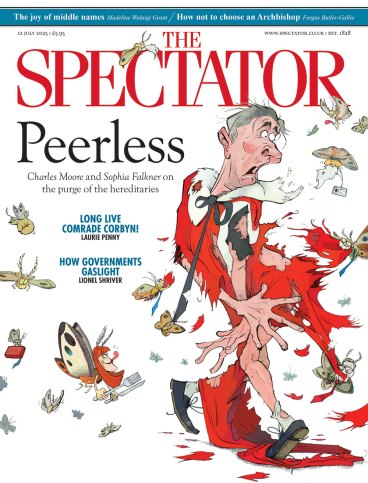
Surprisingly big numbers are the theme of this week’s column, several having flashed up to disturb the pleasures of a summer season of parties, music and sport. The first is the 69,000 tally of jobs shed in the UK hospitality industry since the increase in employer’s national insurance contributions in October’s Budget – the most destructive legislative measure for business in recent memory, except perhaps for the Employment Rights Bill that’s expected to receive Royal Assent before parliament’s recess this month. The UKHospitality trade association thinks losses could rise to between 150,000 and 200,000 by the autumn, as 70 per cent of member businesses cut more staff and pub closures (of which 303 were reported in the first quarter) continue apace.
How obvious it is that bar and restaurant work offers a vital path to keep young people out of welfare queues and other forms of trouble, and to teach them principles of customer service that can be reapplied in more progressive careers? How much better that they should be employed properly, rather than for mean cash and casual hours because that’s all struggling landlords can afford? And how important it is for social cohesion, as this column has so often argued, that the last pub in the village should survive?
Besieged by special pleading on all sides, ministers resort to the rhetoric of fairness and black holes to claim that all businesses must fork out for extra workplace costs. But they should also test this calculation on their focus groups: the more thriving the hospitality sector, the more cheerful the nation, the better chance this hopelessly incompetent cabinet has of surviving parliamentary Labour’s left-wing uprising.
Tsunami alert
Next big number: 23 million people who think they’re eligible for compensation in respect of mis-sold car loans. But this one must surely be spurious, since it extrapolates to the entire UK motoring population from a survey (by the law firm Slater and Gordon) of just 4,000 respondents, of whom 45 per cent said they might make a claim in respect of hidden commissions paid to dealers for arranging finance for car purchases between 2007 and 2021.
The Court of Appeal ruled last year that the finance contracts were unlawful if they did not reveal all details of commissions – thereby creating a field of potential claimants that could assail lenders for £30 billion-plus. The Supreme Court is about to issue a final judgment on the matter – and if it supports the lower court, the Financial Conduct Authority will implement a payout scheme on a huge scale.
Call me a cynic, but I’m hoping the decision goes the other way. Drivers bought cars they coveted on finance terms they believed they could afford and if commissions were buried in the small print (or, oops, not mentioned at all) then yes, that’s naughty – but not sufficiently so to justify a tsunami of claims that could cripple lenders and provoke a mini banking crisis. On top of everything else depressing our prosperity, we really don’t need 23 million new grievances.
Downbeat London
And one more: a 14.2 per cent fall in residential property prices over the past year in prime parts of central London. On a Land Registry colour map of the capital, ranging from purple and red for the biggest value-fallers (Kensington, Chelsea and Westminster) to bright blue for rising outer boroughs such as Havering and Lewisham, every area where non-doms and aspirational entrepreneurs might have chosen to live is showing at least a shade of pink. Among a plethora of downbeat statistics, perhaps the most startling is Savills’ estimate that prime central London values are now 42 per cent lower in inflation-adjusted terms than in 2014. So is this, on balance, a good or a bad thing?
Good if it makes short-commute postcodes more affordable for London workers and if the top end is less distorted by foreign cash of dubious origin. But very bad if it signals that the rest of the world no longer regards the UK as a desirable place to live; if would-be landlords no longer want to be part of a fluid rental market; and if everyone in the heart of the capital has lost the feel-good reassurance of steadily rising home values. And I fear it’s hard to see any of those factors changing while Labour remains in power.
The crying game
That’s enough numbers: let’s tune to the zeitgeist and get in touch with our feelings. Since Rachel Reeves became Chancellor, I’ve yet to write a kind word about her and I’ll certainly be topping up the inkwell with vitriol if she’s bullied by her backbenchers towards a wealth tax in her next Budget on top of all the disincentives to enterprise she’s already wrought.
But like everyone else without a heart of stone, I felt pity when she wept as the Prime Minister failed to endorse her in the House of Commons: if I’d been a gilts trader I might well have joined sellers who drove yields briefly upwards as a signal that they’d prefer her to stay in post. And I experienced exactly the same emotional switchback at Wimbledon on Saturday.
There I was on Court No. 1 rooting with the majority for Emma Navarro, the cat-like daughter of an American billionaire, against the defending champion Barbora Krejcikova. In the first set the stolid Czech looked certain to win, but in the third she wobbled and as soon as she started sobbing the fickle crowd swung behind her, howling support as she pulled back one brave game before finally going down by four to six.
Neither Reeves nor Krejcikova was acting – but both showed how powerful a tactic tears can be. So expect plenty more on all kinds of platforms, from public men as well as women, as the Reeves-driven economy proceeds inexorably down the pan. Worse-than-expected annual results, Mr Bank Chairman, and yet more branch closures to announce? Don’t forget to hide the raw onion in the handkerchief.








Comments